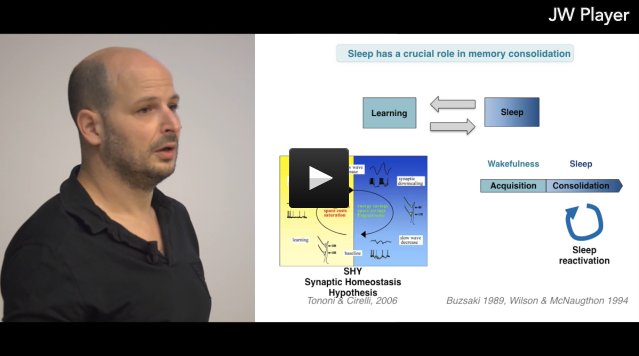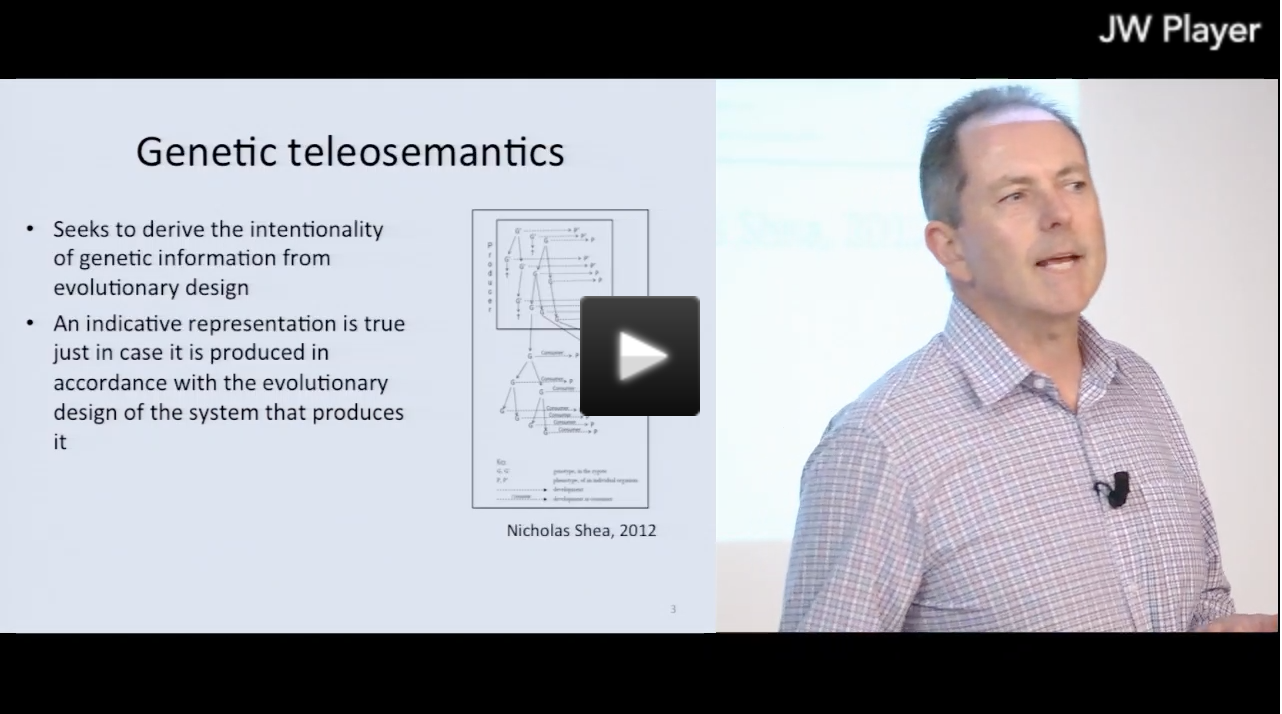FOCUS
Entretien avec Margaux Romand-Monnier
Peux-tu te présenter et parler de ton parcours ?
Apres avoir été diplômée du Dual Masters in Brain and Mind Sciences en 2014, j’ai travaillé au sein du
département d'études cognitives (DEC) pendant deux ans en tant qu’assistante de recherche. J'ai d'abord passé un an au Laboratoire de Sciences Cognitives
et Psycholinguistique (LSCP) afin de terminer mon projet de master 2 sur le développement de la métacognition, sous
la supervision de Louise Goupil et Sid Kouider. J'ai ensuite rejoint l'équipe de Catherine Tallon-Baudry au
Laboratoire de Neurosciences Cognitives (LNC) pour travailler sur des études de neuro-imagerie.
En octobre dernier, j’ai commencé une thèse en neurosciences cognitives au sein du LNC, sous la direction d'Etienne Koechlin, directeur du LNC.
Pourquoi avoir choisi ce sujet ?
 La première fois qu’Etienne Koechlin m’a parlé du projet, c’était il y a un an lors d’un évènement organisé par le LNC.
Ce projet m’a tout de suite séduite, tant sur le plan de la recherche, de son approche pluridisciplinaire,
que pour son originalité. ADAPTATION a pour but d’étudier comment l’être humain s’adapte aux environnements extrêmes sur les plans psychologique,
physiologique et cérébral. Un certain nombre d'études a déjà essayé de caractériser l’effet des environnements extrêmes sur l'homme,
que ce soit au niveau comportemental ou physiologique, mais de nombreuses incohérences, telles que
l'hétérogénéité des conditions "extrêmes", des mesures comportementales ou l'existence de facteurs confondus
(manque de sommeil, déshydratation...) ne permettent pas de tirer de conclusions claires. Le projet ADAPTATION permet d’allier la rigueur des méthodes scientifiques en laboratoire à la réelle complexité des
environnements extrêmes.
La première fois qu’Etienne Koechlin m’a parlé du projet, c’était il y a un an lors d’un évènement organisé par le LNC.
Ce projet m’a tout de suite séduite, tant sur le plan de la recherche, de son approche pluridisciplinaire,
que pour son originalité. ADAPTATION a pour but d’étudier comment l’être humain s’adapte aux environnements extrêmes sur les plans psychologique,
physiologique et cérébral. Un certain nombre d'études a déjà essayé de caractériser l’effet des environnements extrêmes sur l'homme,
que ce soit au niveau comportemental ou physiologique, mais de nombreuses incohérences, telles que
l'hétérogénéité des conditions "extrêmes", des mesures comportementales ou l'existence de facteurs confondus
(manque de sommeil, déshydratation...) ne permettent pas de tirer de conclusions claires. Le projet ADAPTATION permet d’allier la rigueur des méthodes scientifiques en laboratoire à la réelle complexité des
environnements extrêmes.
Sur quel thème spécifique vas-tu travailler ?
Ma thèse portera sur l'aspect cérébral du projet et permettra d'apporter les premières
données de neuro-imagerie sur cette question. Je vais étudier la plasticité du cerveau humain en réponse
aux environnements de vie extrêmes et caractériser ces éventuels changements grâce à une batterie de tests
comportementaux dérivant des sciences cognitives et des neurosciences.
La première phase de l’expédition a démarré au mois d’août avec la traversé en solo du désert du Lut puis de canaux de Magellan en octobre. Quel est ton rôle au sein de l’expédition dans cette première phase ?
 Cette première phase menée par Christian Clot nous permet de nous assurer de la faisabilité des protocoles
scientifiques mis en place. Durant cette première partie, je suis responsable du protocole IRM et d'une tâche
comportementale que Christian pilote in situ. Avant et après chaque expédition, Christian passe trois types d’IRM:
une IRM anatomique, une IRM de diffusion et une IRM de repos. Les deux premières (anatomique et diffusion) nous permettent
de voir les potentiels changements d’ordre anatomique alors que la troisième (IRM de repos), nous permet d’étudier
les éventuelles modifications fonctionnelles du cerveau.
Cette première phase menée par Christian Clot nous permet de nous assurer de la faisabilité des protocoles
scientifiques mis en place. Durant cette première partie, je suis responsable du protocole IRM et d'une tâche
comportementale que Christian pilote in situ. Avant et après chaque expédition, Christian passe trois types d’IRM:
une IRM anatomique, une IRM de diffusion et une IRM de repos. Les deux premières (anatomique et diffusion) nous permettent
de voir les potentiels changements d’ordre anatomique alors que la troisième (IRM de repos), nous permet d’étudier
les éventuelles modifications fonctionnelles du cerveau.
En 2017, Christian Clot emmènera un groupe de dix femmes et dix hommes réaliser les mêmes traversées afin de compléter
le programme d’étude.
Participes-tu à la phase de recrutement ? Quel sera ton rôle dans cette seconde phase ?
Le recrutement pour ce projet est très exigeant et se fait en plusieurs phases.
Les premières phases, auxquelles je participe, permettent entre autres de sélectionner les candidats
ne présentant pas de contre-indications à la neuro-imagerie.
Durant la partie des expéditions en groupe, je serai responsable des protocoles IRM et des études comportementales auxquels les vingt équipiers devront participer avant et après chaque expédition.
Tu vas partir sur le terrain en 2017. Combien de temps resteras-tu sur le terrain ? Que vas-tu y faire ?
La logistique pour les expéditions en groupe va être très lourde. Les vingt équipiers doivent partir avec tout ce dont
ils auront besoin pour vivre en complète autonomie pendant un mois. Je serai donc sur place au début et à la fin des
treks, pour apporter mon aide sur le plan de la logistique.
Christian Clot s'apprête à partir pour l'Amazonie, troisième étape d'ADAPTATION. La forêt Amazonienne est le secteur chaud et
humide le plus important de la planète. Une traversée au coeur de la forêt tropicale Amazonienne, en pirogue et à pieds, sur une distance d'environ 400 km, à la fin de la saison
des pluies, lorsque les chaleurs humides sont les plus fortes.
"28 minutes" - ARTE (November 16, 2016)
Follow ADAPTATION on Facebook, Twitter
ADAPTATION website
Photos
Agence Zeppelin - Bruno Valentin
06 82 07 87 90 - contact@zeppelin-geo.com
IN BRIEF
R for all

Paris’ first R Programming Community for Ladies is a local chapter of a global open source community
promoting gender inclusivity among R practitioners and learners, R-Ladies Global. R-Ladies’ goals are
to provide a supportive and encouraging network for R users who identify as female and to promote learning
and collaboration in the R community, from experts to novices. R-Ladies Paris ultimately drives the
development of R skills through a range of events, including meetups where members tackle hands-on tutorials
and exercises to learn specific functionalities, informal gatherings, talks about latest trends, and debates;
information about relevant external events are also shared. The goal of the community is also to
promote access to STEM careers and tools for women. Additionally, it supports the Free Software Movement
and the global R Community.
R-Ladies'blog
R-Ladies'website
Scalp and culinary cognition

Scalp! is putting together a new roundtable on culinary cognition: "Why do we eat what we eat?
From the brain to the fork". It is open to all and will take place on December 5th at the ENS.
The challenge presented by this roundtable is to better understand how individuals interact with
their food environment. Not everyone enjoys the same food, and one's taste also varies depending
on the occasions. Determining the mechanisms that make certain foodstuff appealing is a complex
issue. This meeting aims at understanding the underpinnings of food behavior, exploring both the
properties of food itself and the associated cognitive, social and environmental factors.
Registration requested
Learn more about this event
Inauguration
Roberto Casati (Institut Jean Nicod) will be part of the inauguration of the academic year at the IUSS Scuola Universitaria Superiore Pavia in Italy, school of excellence in cognitive science.
APPOINTMENT

Joelle Proust (Institut Jean Nicod) has been appointed permanent member of the Académie Internationale de Philosophie des Sciences.
Joelle Proust's website
FUNDING
"What's so special about first-person thought?", an international network founded by the Leverhulme Trust
"What’s So Special about First-Person Thought?" is an international network founded by the Leverhulme Trust
and hosted by the University of Aberdeen. The project aims to investigate the philosophical significance of
first-person thought by bringing together researchers with conflicting views on the topic. The Network is comprised of seven institutions facilitating large-scale collaboration of researchers seeking to understand the nature of first-person thought: University of Aberdeen, ConceptLab Oslo,
Institut Jean Nicod Paris, Logos Barcelona, University of Oxford, University of St. Andrews & Tufts University.
The project is coordinated by S. Torre (Aberdeen) and the French team is led by François Recanati, director of the Institut Jean Nicod.
Read more about "What's so special about first-person thought?"
Read more about The Leverhulme Trust
VIDEOS
When sleep helps to understand wake experiences - Karim Benchenane (Researcher CNRS, ESPCI)

The video of Karim Benchenane's talk at the DEC colloquium is available on the SavoirENS website.
Abstract:
From necessity to sufficiency in memory research: when sleep helps to understand wake experiences
Memory is the ability to adapt our behavior by using the stored information, previously encoded. The first investigations of
the neuronal bases of the memory trace concerned its properties (location, cellular and molecular mechanisms, among others).
However, to understand how this is achieved at the scale of neurons, we must provide evidence about the necessity of a neuronal
subpopulation to support the memory trace, but also its sufficiency. Here, we will present past and recent studies that provide
information about the neuronal nature of memories. We will show that research on sleep, when cells assembly supposedly carrying
information from the past are replayed, could also provide valuable information about the memory processes at stake during wake.
Watch the video
Biological Information: Genetic, epigenetic, and exogenetic - Paul Griffiths (University of Sydney)

The video of Paul Griffiths'talk at the DEC colloquium available on the SavoirsENS website.
Abstract:
It is often said that genes carry ‘biological information’, but what does this really mean ? Recent work in the philosophy
of causation and in complex systems science on the measurement of causal influence offers a natural way to
reconstruct what the co-discover of the structure of DNA Francis Crick meant when he said that genetics
involves distinct flows of matter, energy and information. The resulting quantitative measures of
information provide a common currency to measure the flow of information from genetic, epigenetic
and exogenetic sources, and to compare these influences on a single phenotypic outcome. I will compare
and contrast this sense of ‘information’, which is a measurable property of the causal structure of
systems, to the popular ‘teleosemantic’ approach to biological information advocated by Ruth Millikan,
Nicholas Shea and others.
Watch the video
SOME RECENT PUBLICATIONS
F. Recanati (IJN), Mental Files in Flux. Oxford: Oxford University Press
Abstract:
François Recanati has pioneered the 'mental file' framework for thinking about concepts and how we refer to
the world in thought and language.
Mental files are based on 'epistemically rewarding' relations to objects in the environment. Standing
in such relations to objects puts the subject in a position to gain information regarding them. The
information thus gained goes into the file based on the relevant relation. Files do not merely store
information about objects, however, they refer to them and serve as singular terms in the language of
thought, with a relational (nondescriptivist) semantics. In this framework, the reference of linguistic
expressions is inherited from that of the files we associate with them. Crucially, files also play the
role of 'modes of presentation'. They are used to account for cognitive significance phenomena illustrated
by so-called 'Frege cases'.
In this new volume, Recanati considers what happens to mental files in a dynamic setting. Mental files are
construed as both continuants (dynamic files) and as time-slices thereof (static files). Dynamic files
are needed to account for confusion, recognition and tracking. Mental Files in Flux considers what happens
to the relation of coreference de jure, central to the functional characterization of files, when one adopts
a dynamic perspective. Only a weak form of coreference de jure is said to hold between stages of the same dynamic
file. The second part of the book argues that communication involves interpersonal dynamic files. Special attention
is paid to the communication of indexical thoughts (de se contents) and communication using proper names.
François Recanati (IJN), (Sept.2016), Local pragmatics: reply to Mandy Simons, Inquiry
Abstract :
Abstract :
In response to Mandy Simons' defense of a classical Gricean approach to pragmatic
enrichment in terms of conversational implicature, I emphasize the following contrast.
Conversational implicatures are *generated* by a global inference which uses as a premise
the fact that the speaker has said that p, but only the *triggering* inference is global
in cases of pragmatic enrichment. What generates the correct interpretation is a process
of reconstrual, which locally maps the literal meaning of a constituent to a modulated
meaning and composes that meaning with that of the other constituents. That process is
constrained by Gricean considerations (in the broad sense) but that is true of all pragmatic
aspects of interpretation, whether pre-propositional or post-propositional. Just as indexical
resolution, though pragmatic and constrained by Gricean considerations, does not fit the
two-stage model through which Grice accounts for conversational implicatures, so pragmatic
modulation can’t be accounted for in terms of that model despite the fact that, like conversational
implicatures and in contrast to indexical resolution, modulation is a pragmatic process which
is pragmatically rather than semantically triggered.
François Recanati (IJN), (Sept.2016), Force Cancellation, Synthese
Abstract:
Peter Hanks and Scott Soames both defend pragmatic solutions to the problem of the unity of the proposition.
According to them, what ties together Tim and baldness in the singular proposition expressed by ‘Tim
is bald’ is an act of the speaker (or thinker) : the act of predicating baldness of Tim. But Soames
construes that act as force neutral and noncommittal while, for Hanks, it is inherently assertive and
committal. Hanks answers the Frege–Geach challenge by arguing that, in complex sentences,
the force inherent in the content of an embedded sentence is cancelled. Indrek Reiland has recently
objected to Hanks’s proposal that it faces a dilemma: either force cancellation dissolves the unity of
the proposition secured by the can- celled act of assertion (and Hanks’s proposal does not work), or Hanks’s
proposal reduces to Soames’s. In this paper, I respond to Reiland by offering an analysis of force cancellation
which gets rid of the alleged dilemma. The proposal is based on a set of distinctions from speech act theory :
between two senses of ’force’, two types of act, and two types of context. The role of simulation in force
cancellation is emphasized, and connections drawn to broader issues such as the evolution of complex language.
Philippe Schlenker, Emmanuel Chemla, Klaus Zuberbühler (2016), What Do Monkey Calls Mean?, Trends in cognitive science
Abstract:
A field of primate linguistics is gradually emerging. It combines general questions and tools from theoretical linguistics
with rich data gathered in experimental primatology. Analyses of several monkey systems have uncovered very simple
morphological and syntactic rules and have led to the development of a primate semantics that asks new questions
about the division of semantic labor between the literal meaning of monkey calls, additional mechanisms of pragmatic
enrichment, and the environmental context. We show that comparative studies across species may validate this program
and may in some cases help in reconstructing the evolution of monkey communication over millions of years.
